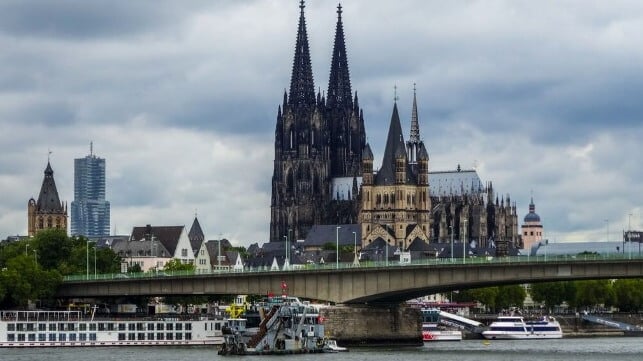Water Levels on the Rhine Continue to Drop, Threatening Commerce

The falling water levels on the Rhine River are getting critically low, according to German officials, and could severely restrict traffic between the Lower and Upper Rhine at the town of Kaub as early as Friday. The low water is already putting a drag on German commerce due to reduced draft for inland traffic; a partial shutdown at Kaub would put more drag on Germany's economy, which is already heavily affected by sky-high natural gas prices and the prospect of an impending cutoff of Russian energy.
The Rhine carries a substantial share of Germany's petchem, crude and coal cargoes, among other commodities, and it provides a vital connection to the Port of Rotterdam, the largest seaport in Europe. Barges on the Lower Rhine deliver bulk materials to the industrial heartland of Germany, the Rhine-Ruhr region. The port of Duisberg, which serves this trade, is the largest inland port in Europe.
“It’s simply the most important river in Germany,” water management official Martin Mauermann explained to the New York Times in 2018, during a previous round of drought. “It’s like the thick branch in the middle of the tree.”
Kaub, a small community upriver of the Rhine-Ruhr near kilometer 530, is home to the shallowest section and is the common reference point for the river's level. Inland shipping has to pass through this choke point to get to the Upper Rhine and access southwestern Germany's industrial centers, like Mannheim. By Friday, German authorities expect that the nominal water level could drop as low as 16 inches at Kaub. A dredged channel at the center of the river has several feet of additional depth, but the miniscule reading at the gauge means that the channel is too shallow for most barges in fully-laden condition.
The low water is already having an impact. Christian Lorenz, a spokesperson for leading European inland operator HGK, told the AP that barges carrying bulk salt between Heilbronn - a town on the Neckar, a tributary - and the city of Cologne on the Rhine are carrying about 25 percent of their normal cargo load because of draft restrictions.
The timing could not be worse: Inland navigation is important to Germany as the nation tries to adapt its economy to the emerging reality of a Russian energy embargo. Coal is taking up new importance for power generation, and one third of the nation's coal imports come up the Rhine. The drought is already expected to reduce power output at two much-needed coal powerplants over the next month.
"In the light of Russia’s war of aggression against Ukraine, the importance of inland navigation for the supply of goods to our society has become once again more than clear," said Oliver Luksic, Parliamentary State Secretary to the Federal Minister for Digital and Transport, in a recent statement.
It is not the first time that a drought has occurred in recent years. In 2018, record-setting low water levels on the Rhine brought a substantial part of the river's traffic to a halt. This interfered with commerce, forcing more cargo onto rail and roads and raising the cost of transportation. In some markets affected by the shutdown, some gas stations ran out of fuel because regional petroleum barge deliveries ceased.

that matters most
Get the latest maritime news delivered to your inbox daily.
Given this recent history, operator HGK is planning for low water to be a part of the long-term pattern on the Rhine. Lorenz told AP that his firm will be incorporating designs for shallow draft into its next generation of vessels.
However, ships aren't the only consideration. In addition to drought, the sector has also been affected by an "extreme lack of young professionals" for many years, transport secretary Oliver Luksic said. His ministry plans to provide support up to about $75,000 to inland waterways operators who open up apprenticeship positions in order to foster recruitment for boatmen/women and boatmasters.
